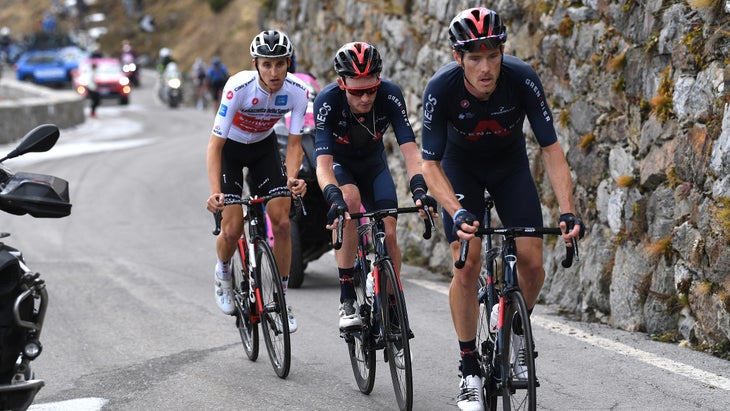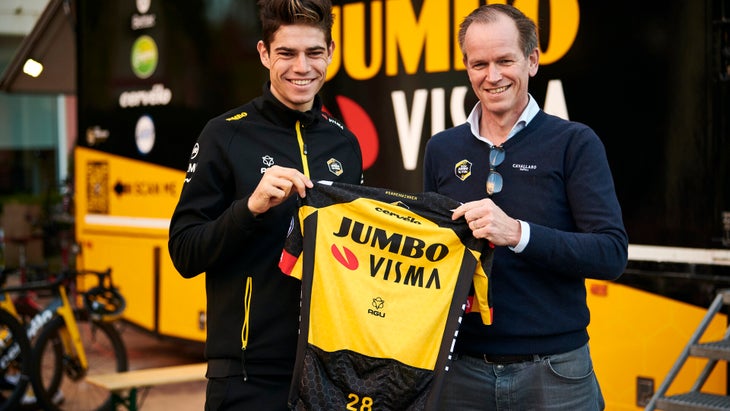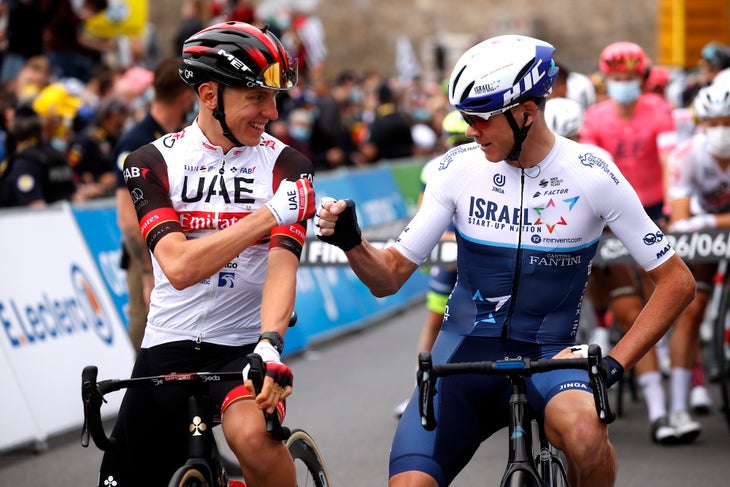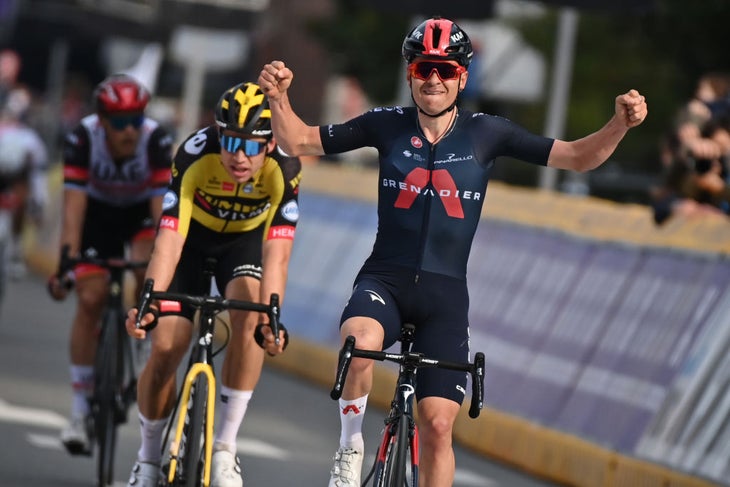For a decade, the Team Sky-Ineos Grenadiers juggernaut ran unchallenged across the peloton.
The team rattled off an unprecedented harvest of yellow jerseys, winning seven of eight editions of the Tour de France with four different riders in a spectacular run from 2012 to 2019.
It was like running a warm knife through butter, and no franchise in cycling history has come close.
And then, almost suddenly, the music stopped. Or so it seems.
Also read: Ineos Grenadiers facing crossroads after Tour de France walloping
Of course, the peloton’s richest team is still winning races. A lot of them. And the team is still winning grand tours. Look no further than back-to-back editions of the Giro d’Italia.
But what it’s not winning is the Tour de France.
And like it or not, that is the peloton’s standard of excellence.
So what’s happening? Is the sun setting on the Sky/Ineos era? Has mastermind Dave Brailsford lost his mojo? Or has the rest of the peloton simply caught up?
Those are all very interesting questions going into 2022.
Rohan Dennis starts a barn fire

You gotta love Rohan Dennis.
No rider in the peloton races and speaks as unfiltered as the Australian time trial beast. Dennis calls it like he sees it, and if you don’t like it, well, that’s your problem.
Last week, Dennis dropped a bomb during his new team Jumbo-Visma’s media day. The context of the comments made it even more interesting in that they came in the middle of a team-issued, highly produced PR video that was released on YouTube.
Here’s what he said:
“There are a lot of things the team is doing really well. I’ve noticed that when I was with Ineos that they were copying Jumbo with a lot of stuff. I thought, well, why would I want to be on a team that is copying the team on the other side of the fence. Why not go join that team and be on the front foot and not on the back foot? So, I wanted to move here because it is a better team.”
Whoa.
Shots fired from Rohan Dennis: “Ineos were copying Jumbo in some aspects and I thought why stay at the team that was a step behind”
— Dan Deakins (@DanDeakins) January 11, 2022
There could be some sour grapes there, and those comments might be tailored to make his new bosses happy, but one of the world’s best time trialists just called out Ineos Grenadiers as missing the beat.
Also read: Rohan Dennis joins Jumbo-Visma
Dennis didn’t go into specifics, but his comments underscore a trend that’s dominated the peloton ever since the “Sky Method” swept the paddock a decade ago. Team Sky under the tutelage of Brailsford and lead trainer Tim Kerrison helped modernize professional cycling.
Call it “marginal gains” or whatever else, but there’s no mistaking that Team Sky took pro cycling to a new level. Add the deepest budget in the peloton and perhaps some questionable tip-toeing to the ethical line, and Sky undeniably rewrote the script of professional cycling.
All the insiders knew it, and everyone started a desperate chase to catch up.
Yet what Dennis’s comment reveal is that in the past few seasons some in the peloton have indeed pulled level to the Sky/Ineos machine.
Matt White: ‘Other teams have caught back up’

So what does that mean, “catching up?”
A big part of it is budget. Ineos Grenadiers’ season-long spending tops $45 million annually, a princely sum still dwarfs its closest rivals. The team doles out a lot of that money on salaries, and its back bench is typically deep enough to field two or even squads in any grand tour.
Ineos Grenadiers also invests a lot of money in back-room staff, equipment, training camps, coaching, lab testing, science, and nutrition. That’s where the sport has made most of its advances in the past decade or so, and that’s where the other rivals have invested in heavily.
The two teams that have come closest — in terms of budget, back-room investment and talent — are UAE Emirates and Jumbo-Visma. A few others are not that far behind.
Matt White, lead sport director at Bike Exchange-Jayco, is on the frontline of this financial and technical struggle against Ineos Grenadiers.
The Aussie-backed team managed to deliver a grand tour victory with Simon Yates in the 2018 Vuelta a España. In fact, since 2017, BikeExchange, Team DSM, and Movistar are there only teams to break the grand tour stranglehold that UAE Emirates, Jumbo-Visma and Ineos Grenadiers currently grip on the three-week grand tours. Two of those above winners — Tom Dumoulin and Richard Carapaz — now race on Jumbo and Ineos, respectively.
I asked White what’s happening inside the paddock:
“I don’t think Ineos Grenadiers have been eclipsed. I think other teams have caught back up and now have the same resources as them. Before, Ineos had more resources than anybody else and they were thinking in a way that actually did change the sport. I think now — the UAEs and Jumbos — have similar types of budgets and have put people in place in their teams who are working in very similar ways. I don’t think that Ineos has been eclipsed. There are definitely teams that are working in a very similar way in both a financial and technical aspect as well.”
Also read: Jumbo-Visma sketches out impressive Tour de France team
All the teams in the men’s WorldTour peloton now boast small armies of nutritionists, chefs, coaches, trainers, aerodynamic and tech specialists, doctors, and physical therapists all working to squeeze top performances out of its riders.
That’s a far cry from the days when sport directors would organize training and racing programs for racers across a team.
Chris Froome: ‘A much more level playing field’

Of course, the other essential piece of any winning strategy is having a winner.
Team Sky/Ineos brought them in spades. First with Bradley Wiggins, and by the later part of the decade, the system was so well-oiled that Geraint Thomas and Egan Bernal each added a yellow tunic to their wardrobe.
The key figure to the Sky run was Chris Froome.
A few are too quick to write him off, especially with his odd pedaling stroke and unconventional racing style, and others accused him of being a cheat — that simply goes with the territory of being a Tour dominator — but Froome was the perfect rider for the Sky system.
As nutrition, training, precision, technology, and efficiency became part of the winning formula — assuming that recipe never included massive amounts of PED’s — Froome delivered the ideal personality, ambition, and engine to fully realize the Sky method.
Like him or not, winning four editions of the Tour, two titles at the Vuelta a España, and one Giro, Froome is the most successful grand tour rider in the modern era. And he won all those victories at Sky/Ineos.
Also read: Chris Froome stubbornly refuses to give up on yellow jersey quest
In a press event Thursday with Israel-Premier Tech, I asked Froome if he thought that Ineos Grenadiers was no longer setting the tone in the peloton.
Here’s what he said:
“It’s fair to say, a decade ago, that Team Sky was setting the benchmark. Other teams have caught up. It seems at the moment, there are two or three of the bigger teams who are on a similar kind of level, especially when it comes to riding the grand tours and controlling the grand tours in terms of the general classification. It does seem to be a much more even playing field in that sense.”
Getting down to business.👊#UAETeamEmirates #RideTogether pic.twitter.com/9Nc2ov42MX
— @UAE-TeamEmirates (@TeamEmiratesUAE) January 14, 2022
UAE Emirates and Jumbo-Visma are those teams that have the financial backing, raw talent, and the back-room staff to really bring it up to the Sky/Ineos level.
What those teams also pack are winners. Tadej Pogačar burst onto the scene faster and more dramatically than anyone could have imagined. And despite a few dramatic miscues along the way, Primož Roglič is a tiger on the bike.
Those two set the tone in any race they start.
The Slovenians are untouchable right now, and these next few seasons will tell us if Bernal, Carapaz or anyone else is up to the task to take on these usurpers to the Ineos crown. The jury is still out on Bernal on whether his fragile back and inner drive can match the steely resolve of the Slovenians.
Froome gave Brailsford that winner. Bernal recently re-upped his contract through 2026, so the team still believes the Colombian can be their next franchise rider.
At the end of the day, one thing hasn’t changed. It doesn’t matter how much money a team can spend; if the central GC captain isn’t a winner and doesn’t stay healthy, the wins won’t come.
The takeaway? There’s a crowd at the top, but don’t write off Ineos Grenadiers just yet

Dennis stated the obvious this week: Ineos Grenadiers no longer owns a monopoly at the top.
Nearly every major WorldTour team is investing in science and recruiting, resulting in a much more level playing field in grand tours and stage racing than at the peak of the Sky era more than a decade ago.
Many took their cues from what Sky brought to the paddock a decade ago, but that head-start is gone.
And two teams, UAE Emirates and Jumbo-Visma, have the rare but essential treble — budget, back-room support, and frontline winners — to take it straight to, and perhaps even surpass, Ineos Grenadiers.
Of course, Ineos Grenadiers isn’t blind to this challenge.
Led by Rod Ellingworth, who is taking over the day-to-day from Brailsford, the team is shaking up its backroom staff, underscored by the exit of longtime coach Kerrison. Bernal and Carapaz remain at the center of the team’s GC ambitions, but Ineos is heavily investing in finding its next Froome. The team is packed with young, raw talent thanks to a recruitment program that dates back a few years, with Tom Pidcock looking poised to emerge as a Pogačar-killer if he can continue to his impressive upward trajectory.
Also read: Tom Pidcock ramps up road ambitions
In fact, Ineos Grenadiers packs more grand tour winners with four on its roster — Thomas, Bernal, Carapaz and Tao Geoghegan Hart — than any team in the peloton.
The team’s distractors might be disappointed, because Ineos Grenadiers isn’t going anywhere.
What’s this mean for fans? Good times lie ahead.
Right now, grand tour racing is deeper and more wide open than it’s been in decades.
This year’s Tour should see the first head-to-head clash between Pogačar, Roglič and Bernal since Pogačar’s unexpected rise in 2020. Other teams are knocking on the door. No one is settling for the status quo. The pressure is on to evolve, improve, and post results.
The 2022 clash at the Tour could well set the team dynamics for the next few seasons.
What’s certain is that cycling could be hitting a golden age of grand tour racing that will see several riders and teams race in an epic tug-of-war for victory.
That’s much better than seeing one team and one rider reel off yellow jersey after yellow jersey, non?
